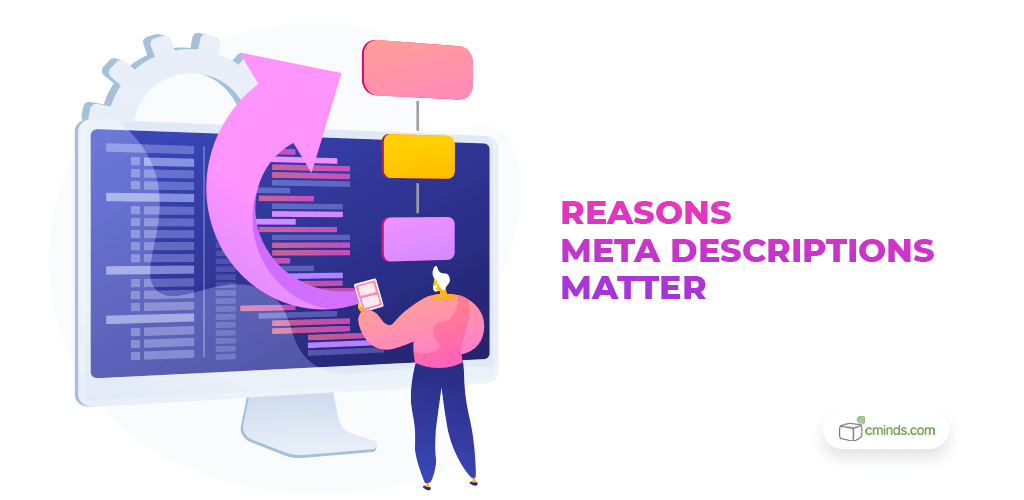Do meta descriptions matter? In this blog, we examine the state of meta descriptions in 2021.

Spoiler alert: the answer is yes. Meta descriptions matter. But, there’s a little more to it.
The relationship between meta descriptions and SEO has changed, and you might be wondering exactly why meta descriptions matter.
We’ll also be giving some Do’s and Don’ts for writing meta descriptions.
So, let’s get started.
December 2024 Offer – For a Limited Time Only:
Get WordPress SEO Keyword Hound Plugin for 25% off! Don’t miss out!
What is a Meta Description?
Meta descriptions are short snippets of text that appear under page titles in search engine results pages (SERPs). A well written meta description gives a brief summary of the page content.
It really is as simple as that. So what else is there to say about meta descriptions?
First, let’s take a look at meta description’s relationship with search engine optimization (SEO).

Meta Descriptions and SEO: A Complicated Relationship
Once upon a time, meta descriptions were important as they directly influenced search engine rankings.
Search engines would trawl meta descriptions and, if keywords were included, the page’s rank would increase.
That all changed, however, when Google realized the rules were being abused.
Some sneaky meta description writers would relentlessly stuff their meta descriptions with keywords, in the hopes they could trick the algorithm into giving their page the #1 rank.
It didn’t take long for Google to get wise to this, and they soon changed the algorithm to address the issue.
While no-one can be exactly sure how the closely guarded algorithm works, it’s generally accepted that meta descriptions no longer directly impact your SERP ranking.
As Search Engine Land outline: “The meta description tag won’t help you rank, but it will often appear as the text snippet below your listing, so it should include the relevant keyword.”
This has lead many people to ask: do meta descriptions matter anymore?
CTR: Why Meta Descriptions Matter

When asked this question, our answer will always be: yes, meta descriptions matter.
The reason why lies in meta description’s relationship with click through rates.
What Is The Click Through Rate?
Click through rate – or CTR – is about the number of people who click on your result when it appears in SERPs.
The click through rate of any page is calculated by dividing the number of clicks by the number of people who saw your link in the SERP. Google gives an example: if you had 5 clicks but 100 impressions, your CTR would be 5%.
CTR is important to search engines because, in the pay per click model, each click equals more revenue for them.
CTR and Meta Descriptions
So, what do meta descriptions have to do with CTR?
When looking at any search engine results page, there are three components that can influence a user’s decision to click – or not to click, as the case may be.
These components are: title, URL, and, you guessed it, meta description. All three work together to give a picture of what the webpage is about.
However, the meta description is arguably the most important factor as it’s the largest of the three. For this reason alone, meta descriptions matter.
They’re the first impression that users will get of your website content, and serve as the hook to draw them in and click through to your site.
It should also be noted that Google doesn’t always use meta-descriptions. If Google doesn’t think the meta description represents what’s on the page or adequately answers the users search query, it will automatically select a snippet from the content that’s a better fit.
So, with this in mind, it’s important to know and understand how to craft the perfect meta description.
Tips for Writing Meta Descriptions

We know a thing or two about meta descriptions. Here’s some tricks of the trade we’ve picked up over the years. We hope that these will help you craft attention grabbing meta descriptions.
DO Keep It Concise
Meta descriptions have character limits, so you need to hone the art of being compelling and concise.
The optimal length for a meta description is between 50-160 characters. Stay within this limit to avoid getting cut off.
DON’T Duplicate Content
Every web page should have a unique meta description.
If you have a lot of web pages, you might be tempted to copy and paste to save time. This won’t help you in the long run.
To get the most out of your meta descriptions, make sure each one gives a unique overview of the page.
DO Include Keywords
Google highlights keywords in meta-descriptions in bold.
This draws the users eye, showing them that the term they searched for is relevant to the page. That’s why it’s always a good idea to include one or two target keywords in your meta description.
It might not improve your SERP ranking, but it can certainly improve CTR.
DON’T Use Special Characters
Did you know that Google will cut off your description if you use double quotation marks? Well, now you do!
Its best practice to avoid all non-alphanumerical characters and symbols except for apostrophes, colons, or semi-colons.
There You Have It – Meta Descriptions Matter

Meta descriptions are still an important part of website copy.
While they may not directly impact SERP rankings, they can make or break your CTR.
Crafting the perfect meta description can time time and effort, and even a little trial and error, but it’s well worth the effort to improve CTR.


